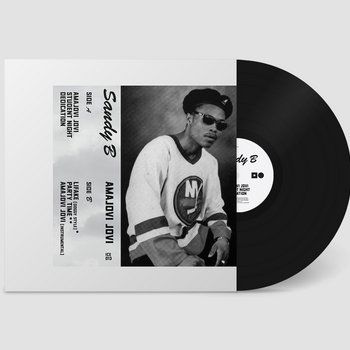
In 2016, a pair of obscure songs started turning up on YouTube playlists, that were equal parts infectious naiveté and vague familiarity. If a listener was worldly enough to guess the language being sung as KwaZulu-Natal street slang, the staccato delivery still sounded extremely bizarre for South African music—and entirely at odds with the stone-cold synths pulsing behind it. The path of these two songs, “Amajovi Jovi” and “Student Night,” to entering online public consciousness 22 years after their creation is just one chapter in the courageous—and heartbreaking—untold story of their author, the original Durban Kwaito artist, Sandy B.
At the time of writing, Sandy B is currently six months into a seemingly never-ending world tour. During the course of our conversation, he excuses himself several times to confirm upcoming gigs, book studio time with young Berlin producers, and to show off private videos of Róisín Murphy name-checking him onstage whilst performing his remix of “Time is Now” in Ibiza. The impressiveness of his positivity and DIY hustle is almost enough to ignore his resume gap between the founding of Kwaito music—the soundtrack of post-apartheid club culture in 1994—and his comeback in 2017. Despite being labeled by the African press as “Durban’s Sugar Man,” his arduous personal story has been too painful for him to reveal much publicly. His comfort and trust in his path—“out here in the world, it gives me healing. I have no family, but when I’m on tour, I find my family…I connect people, that’s my talent”—is finally at a point where he can share the harrowing tale of the obstacles he climbed to get where he is today.
[Editor’s note: The author has toured with Sandy B and the two have had a professional relationship.]


Sandy B was born as the sixth of seven children into the home of his mother in Mpumalanga, better known as Hammarsdale, 50 km west of Durban. While four of his siblings had the same father, he himself would never know his own, and felt “a distance between the rest of my family that I could not put into words.” Before his teenage years could begin, Hammarsdale exploded into historic political violence in the late ‘80s. Amongst scenes of burning houses and shootings, where he saw, “people I grew up with shooting at each other,” Sandy relocated alone to a family friend’s house in Chesterville, closer to Durban and relative stability. After his brother was exiled as a member of the ANC, Sandy was moved to a semi-rural community nine hours away in Swaziland for his own safety. This marked the beginning of a two-year period where Sandy would lose contact with his mother and start to learn the kind of savvy life skills primarily reserved for children who have to fend for themselves. Sandy cashed in on his natural charm and city-boy image by earning money doing “Durban-style perms” with cooking oil disguised in expensive hair care bottles, or offering flash photography for a downpayment—with a camera that had no film in it—while trying to finish school. During this period of extreme poverty, Sandy remembers a tape of Aretha Franklin’s greatest hits being one of his biggest inspirations, his comfort during “the loneliness of seeing all the other school children come back from holidaying with their parents.”
After Mandela was released from prison, the easing of political tensions allowed Sandy to return to Durban in 1992 to try to find his mother. When he got there, he found a new social climate, and formed his first biracial pop group, called Paradox, in 1993, “to welcome in the new South Africa, and play Afro-European music in the clubs.” A lack of financial stability prevented his attempts to go to Business College, and he would receive his first major break whilst visiting the trendy new hip-hop clothing store, Third Base. Covering for his friend’s bathroom break, he turned on the charm for customers at the same time that the boss happened to be visiting. Impressed by his moxy, Sandy was soon employed at the company’s new branch, where he “saw the changing face of South Africa, where all of a sudden I was selling hip-hop clothes to people from all backgrounds—and dating them, too!”
Sandy had demo tapes ready to go, and he used his social clout to score a slot as the only local act on the lineup at the legendary first-ever Kwaito event at the Village Green in Durban on April 27, 1994. All of the big Johannesburg stars—many of whom had scores of television appearances and recordings under their belts—performed, names like Boom Shaka, Thebe, Trompies, and Dj Oskido. Sandy’s internal hustle was activated. “I knew I had to stand out,” Sandy says. “So I choreographed two backup dancers and dressed them in the best clothes from the store.” Positive feedback poured in, including from Doja Cat’s father Dumisani Dlamini, who was acting in the musical Sarafina at the time. It was Dlamini who fostered Sandy’s first visit to a studio under the name Sandy B.




Vinyl LP

By late 1994, Sandy was in the home studio of Chaz Rogers, who was making coffee as Sandy fingered the keyboard looking for a riff. “Hey!” Chaz cried from the kitchen, “That’s great, just keep it simple!” They recorded it, and Sandy improvised onomatopoeic vocals, “based on a short friend’s hopping dance moves—’Amajovi Jovi!’ We added a police siren to the beginning of the song to capture people’s ears.” A few days later, Sandy was bringing the tape to the Genesis nightclub on the revered student night. These were very serious events: Chartered buses would pick students up from residential areas just for these giant parties, a fact Sandy knew well. The DJ took his tape without hesitation, and the song “hit the spot and packed the dancefloor.” When it finished, the crowd was screaming for the DJ to play the tape again, ecstatic to finally have their city represented in the Kwaito milieu.
The hype was real. Dj Oskido organized a meeting between himself, Sandy, and legendary producer and orchestrator of new South African music, Don Laka for the Kalawa label, who Sandy describes as, “a broke label with a big vision!” Although the meetings were unsuccessful, businessman Tim White would eventually finance the pressing of Durban’s first ever Kwaito album: Sandy B’s Amajovi Jovi. Sandy was caught off guard when he got the request for more songs and a cover photo. At the time, he was working seven days a week at the clothing store and had to rush downstairs in the mall to book a professional photoshoot. He wore the iconic dark glasses and bucket hat that is now synonymous with his look. At the time, it was a practical measure: If the record flopped, he could still hide his identity. After these images were plastered all over the fashion store—which was now reaping the benefits of its employee’s success—a representative from Kangol took notice, and Sandy B was offered a Kangol sponsorship, the second in the world after LL Cool J.

Vinyl LP

By 1995, Sandy’s life could not have been further from the abandoned teenager fending for himself hundreds of kilometers away from his family years ago. His name was gradually rising up the marquee of any venue he would play, despite not having the same airtime as the Johannesburg Kwaito artists who were finding mainstream success. This he attributed to the hard work of his manager, who continually booked “promo shows” where he worked for free, but achieved visibility. “That was OK,” he says. “I was used to such treatment after my original run in the gospel scene, where we played a lot of church benefits.” But it was during a week of festival shows, where Sandy saw his name advertised all over taxi cabs in the city, that his entire world came crashing down. Whilst visiting his manager’s office between shows that week, Sandy spotted a fax thanking his manager for one of Sandy’s “free” shows, and hoping the money arrived in his bank OK.
“How could I learn to trust anyone again?” Sandy says. “I had been ruining my health, performing later and later on big events while working my seven-day-a-week job to survive.” His heartbreak forced him to take a sabbatical, acting simply as a promoter for the music he loved and as a mentor for up-and-coming artists. In the early ‘00s, he quit the clothing store to branch out into the CD-burning and label design business, showing his legendary hustle once again by buying a broken computer monitor for his office as a way to induce trust in potential clients.


In perhaps the ultimate display of kismet, Sandy would finally have his comeuppance, just as the CD-R market started its downfall. Afrosynth label founder Dj Okapi was sitting for a 2015 “Boiler Room Collections” session—where two DJs pull and play records at random from the Boiler Room stacks—with fellow South African producer Esa Williams. Rewatching the session now, it’s amusing to see the two exchange quizzical looks when they come across the extremely rare copy of Amajovi Jovi. They even debate the speed at which the record should be played. This appearance between two consummate diggers would sent the online DJ community in a frenzy, with a YouTube upload of the track becoming algorithmic alchemy from all the “who is this?!” requests in the YouTube comments section.
Sandy was unaware of the phenomenon until he started to receive emails from diggers and reissue labels alike. “I was so focused on making CDs, I didn’t even know there was a vinyl resurgence,” he remembers. “It felt like the same hype as 1995, but on a global level. So I was chill, it felt like it was happening at the right time.” Canada’s Invisible City won the reissue bidding war, and around the same time Sandy was visited by Danish producer Simone Ahà, which led to the near perfect follow-up album Qhum Qhaks, with Simone crafting his productions to land as close to Sandy’s original sound as he could. By early 2020, Sandy had organized his first European tour, completely self-booked by reaching out to fans. He still uses this method today, informed by his distrust of the business. To book Sandy B is an intimate affair: You simply write directly to him on social media, and he rocks up to your house soon after. He has been traveling around Europe like a new-school pop troubadour, accepting most offers to collaborate—which is how he ended up on an album by Russian indie pop band SBP4, eventually joining them on tour in Estonia, Latvia, and Lithuania. His omnipresence in the digital world has helped lift the kwaito genre out of its post-apartheid time capsule and into the present day.
And as Sandy B currently works with a host of young Berlin-based producers, trying to synthesize his skills in a new style he calls BINK music, it’s a good time to remember that Kwaito history is full with tragic endings, untimely deaths, murder, imprisonment, and bankruptcies. The price of stardom in those early years was exorbitant for many of the top talents. For Sandy B, surviving the storm to play music on his own terms is a truly heroic story arc.







